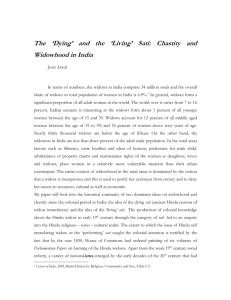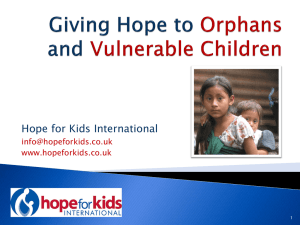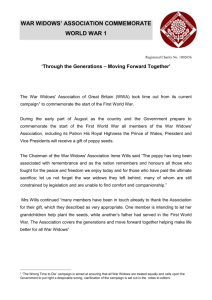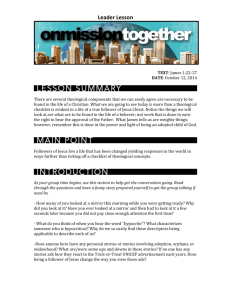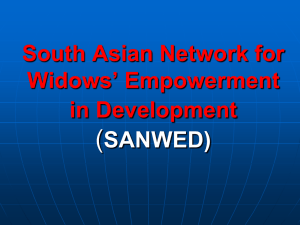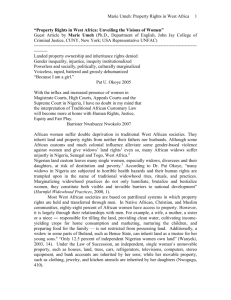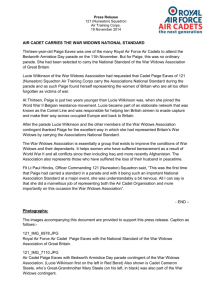- Covenant University Repository
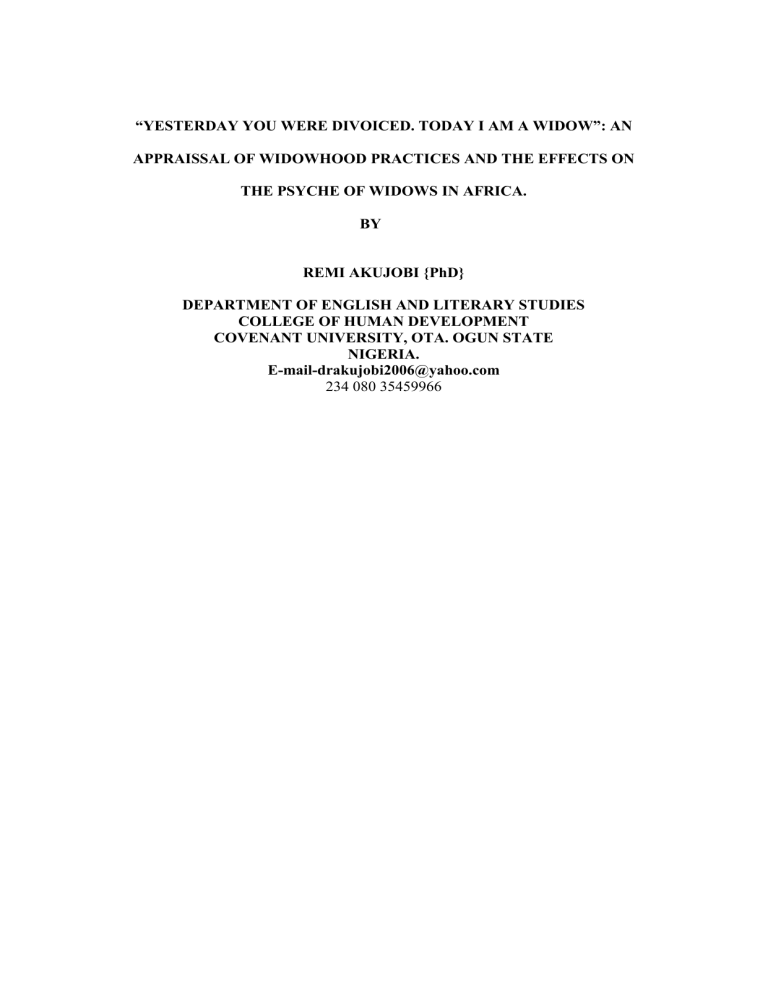
“YESTERDAY YOU WERE DIVOICED. TODAY I AM A WIDOW”: AN
APPRAISSAL OF WIDOWHOOD PRACTICES AND THE EFFECTS ON
THE PSYCHE OF WIDOWS IN AFRICA.
BY
REMI AKUJOBI {PhD}
DEPARTMENT OF ENGLISH AND LITERARY STUDIES
COLLEGE OF HUMAN DEVELOPMENT
COVENANT UNIVERSITY, OTA. OGUN STATE
NIGERIA.
E-mail-drakujobi2006@yahoo.com
234 080 35459966
“YESTERDAY YOU WERE DIVOICED. TODAY I AM A WIDOW”: AN
APPRAISSAL OF WIDOWHOOD IN AFRICA.
ABSTRACT
Widowhood is a reality for as long as people are born and people die. Widows are found in every community but in Africa, the experience of the widow is such that women dread to be widows. In Africa, widows go through a lot of hardship that stems from the society, the husband’s family and from tradition.
This paper tries to look at the nature of the woman, see how this subscribes to the treatment she receives in society especially in her time of grief and loss. This paper will focus on the plight of widows in some communities in Africa and how gender and its attendant problems impede on the woman’s social standing and general development in society. In looking at the issue of widowhood in Africa, the reference point will be Mariama Ba’s novel,
So Long a Letter where the paper will be addressing how the African woman handles widowhood and how the African society sees the widow. From study, it is observed that the term “Widowhood” has not really attracted much criticism in African Literature. In this sense, this paper will be examining some feminist theories in an attempt to adequately appraise this situation.
2
INTRODUCTION:
If I should die and leave you here awhile
Be not like others, soon undone, who keep
Long vigil by the silent dust and weep.
For my sake turn again to life and smile
Nerving thy heart and trembling hand to do
Something to comfort weaker hearts than thine
Complete those dear unfinished tasks of mine
And I, perchance, may therein comfort you.
Anonymous.
This may not be true for the African woman passing through this phase of life in the sense that widowhood in Africa has never been a period of “Comfort” and the only aspect of this poem, if one may call it so, that may concern the African woman in that state would be the seventh line “complete those dear unfinished tasks of mine”. The issue of women as vital, autonomous and formidable social force was until recently a mirage in critical discourse. This may have started long ago in Europe and America, but did not gain much ground until the early 1980s. In Africa, the issue of the woman just recently came into focus.
Gender as a recognized phenomenon today makes it almost impossible for one to address any issue whether in politics, economy, philosophy, literature, name it, without a specific reference to gender. Showalter (1989:1) quoting Rutven considers gender a “crucial determinant in the production, circulation and consumption of literary discourse” One is therefore tempted to apply the principles in the analysis of widowhood. In applying these principles, one must first and foremost look at the place of widows in society.
This article discusses the plight and suffering of widows in terms of their social, economic, psychological and human rights violations in Africa. The article describes the situation of the widows as silent victims who suffer cruel and dehumanizing
3
cultural and ritual practices as a mourning process for their dead spouses. The article also examines the gender inequalities suffered by the widows and makes some recommendations as to how these practices could be minimized or eliminated from society
Widows make up to about half of the adult female population in many African societies as Potash (1986: 1) reveals but very little is said about them and their situation or plight in any discourse. Most of the materials gathered on widowhood practices in African societies can be said to be “raw” and “unprocessed”. The absence of a diachronic research on the issue of widowhood makes the practice very difficult to assess. This is to say that literature available on widowhood practices particularly in Africa is very little. The dearth of African literary genres that would have interrogated the plight of widows show evidence of her “silencing and invisibility” and this may be responsible for the very little materials available today on widowhood.
Given this situation, African literary criticism will have to explore this rather
“dry” area of African experience because it is essential. Critical appraisal is necessary and pertinent in that, African perspective more than anyone else’s can appropriately and adequately explain, describe and interrogate this aspect of life and it is through continuous examination and portrayal of African realities that the world will get to see where the problem lies and adjustments made. It is in this light that this paper tries to cut into the plight and suffering of widows in their social, economic and psychological state using Ramatuolaye,s experience in Ba,s So Long A Letter to break into the position of women in general and that of widows in particular. The paper looks at the situation of widows as silent victims, it also examines gender inequalities suffered by widows and makes some recommendation as to how widowhood practices can be minimized, given a human face or totally eliminated in African societies. As an
4
important treatise on the heart-rending plight of widows in African societies, this paper delineates the oppressive structures that give rise to oppressive traditions and so the paper will examine what is actually responsible for these traditional practices.
THE WORLD OF WIDOWS
The study of African women and by extension, the African widow is an attempt to draw attention to the misfortunes and travails in the African woman’s experience.
Understanding widowhood as a discursive framework for explaining women’s role and position in most African societies therefore requires a deep tracing or historicity of African ways of knowing things or interrogating the past to help us understand the present and then give direction as to how to chart the future. This would mean knowing the plight of the widow, knowing the world of the widow, what goes on there, how the widow is coping with widowhood, knowing the society’s reaction to her situation, see her pain, her loss, her desires, knowing where she stands in the scheme of things. But the focus on African widows has only been a negative one with questions directly interrogating her total being. Questions such as: “how are we sure she has no hand in the husband’s death by any means?” “Is she involved in any conjugal relationship?” “Is she planning to have more children?” “Will she return to her family after the period of mourning?” “How much is she entitled to from her late husband’s estate?” are asked. The lives of widows in Africa run through a number of unimaginable phases, but the reality is that many widows had nothing to do with their husbands’ death, many live without spouses for the rest of their lives, many of them are just victims, many, especially the older ones do not even think of having children after their husbands’ death rather, they are concerned with how to raise the children they already have and in most cases, many of these widows are left with little or nothing as inheritance. But widows in most African societies have choices and they
5
sometimes exercise them. Some widows have successfully fought the so-called tradition to have their rights restored to them. The point now will be how much choice do they really have because it is known that the African woman seldom expresses herself, she has been indoctrinated by her growing up in an exploitative sexist society
(Beale, 1986:7) so she bottles up most of the time and she resigns to fate but resignation to Ogundipe-Leslie (1993:107) is not the only problem confronting the
African woman. Others are colonialism and neo-colonialism, traditional structure, men, backwardness, colour and the woman herself and these problems need urgent solution. Hence, looking at widowhood practices in most African societies, one can not really say they have much choice; acceptance is their best option if they are to live in peace with their societies without been tagged rebels. Again there is no communal supports for widows, many of them rely on the work of their hands; many of them also live alone. Access to land is practically a mirage and they face a lot of challenges in their dealings with their in-laws as attempts are made to take control of the socalled property and their persons.
In Afemai land of Edo State for instance, widows are treated as outcast, it is always that the woman knows something about her husband’s death, either through adultery or witchcraft and for this reason, she is often humiliated, she not allowed to have a bath, nor wash her hands after eating. She is not to change her clothes or underwear. She will have to sit and sleep on the bare floor during her period of confinement. Sometimes, widows have to go into the thick forest at night and recite some incantations for the purpose of “cleansing”. Widows are also made to drink the water used to bathe the corpses of their deceased husbands ; they are shaved and kept in seclusion for months while consultations are on as to the real cause of death of the man. The widow is not expected to receive condolence visits from sympathisers
6
during the period of mourning, she is to be re-married by a relative of the late husband, she is to sit on the floor or be naked during any period of the husband's burial rite, weep and wail loudly at intervals, she must remain in confinement after the death of the husband for the given period dictated by tradition. In most cases, she must vacate the matrimonial home for the relatives of the man.
In Igbo land as in other parts of Nigeria, widows are subjected to numerous hardship in an attempt to absolve them of guilt, they are shaved, kept in dark rooms for days with little or nothing to eat, sometimes they are made to sleep in the same room with their dead husbands and the water used in bathing the dead man is given to the woman to drink. Any attempt by the widow to contest this is met with stiff resistance and name-calling. The factors influencing widows’ lives, the options available to them and the multiplicity of interests that affect their behaviour, have not been systematically examined and so it is not out of place for the widow to feel neglected and her experience distorted in literature. These two- neglect and distortion to Potash stem from three sources: one is the concentration on the widows’ remarriage, second is that very little attention is paid to the widow’s economic role because she is often seen as a dependant and not a contributor to wealth and the third is the treatment of widows especially from the complex influence of an outworn paradigm. All of these show widows as passive pawns, so, drawing attention to the plight of widows in Africa is a great task indeed as people are not willing to discuss the subject perhaps as a woman pointed out, for fear of becoming one.
Widows are reluctant to discuss the issue of inheritance and the possible cause of death of their partners for fear of repression. Fear described by Mark Morton
(2005:1) as a powerful motivator and when laced with ignorance, it can lead to deadly
7
consequences. Widows are afraid because of fear that they may be exposed to the outside world. Widows do not talk about themselves either for fear of what their kin may say or think about their outspoken nature, so they remain silent, they constantly hide behind their masks and wear smiling faces even in the face of hardship and deprivation. Widowhood throughout Africa as one may point out is a period of hardship and deprivation as it includes varying degrees of physical seclusion for ritual purification. Inheritance does not offer the same level of solace and support as marriage did but as Potash (1986) points out, widows often took on an even larger role in their families’ welfare.
In some societies, traditions prescribes harsh injunctions for widows, they are denied the use of ornaments, perfumes, flowers, fine clothing, no making of hair, in most cases, widows are shaved as a mark of respect for their departed husbands and they are denied all other beautiful things women cherish. In other societies still, widows are denied the three basic meals a day, they are to sleep on the bare floor and are to observe celibacy and other untold hardships. In Shadow Lives: Writings on
Widowhood edited by Uma Chakravarti and Preeti Gill, a broad historical canvas of meanings surrounding the social category “widow”, especially in India was clearly painted. The book states that widows are practically exploited in India; they are oppressed and are seen as “shadows” of womanhood. The same can be said for widows in Africa because the diversity and complexity are interwoven in the common experience of loss, deprivation, helplessness and hopelessness.
The death of a loved one brings trauma, grief and a total restructuring of one’s life.
Widows experience economic hardship, emotional and social problems so, they pass through a period of loneliness which manifests in so many ways. They go through phases of bereavement which include, phase of numbing which is the immediate
8
reaction to the loss of one’s spouse, phase of yearning and searching, phase of disorganization and phase of re-organization (Woof and Carter 1994:444). In all these phases, the widow’s companion is uncertainty.
Looking at widowhood in African societies, it is not so hard to have an on-the-spot verdict on the plight of widows. It may not be wrong for one to conclude that economic rather than any other interest is responsible for the treatment widows receive in society. Human greed which exists in African societies very much like others makes it possible for the easy exploitation of widows, the urge to acquire material wealth, particularly what is considered “free” wealth controls the treatment of widows in society, all other activities, including levirate, may serve the same purpose. So any mystification and rituals, superstitious practices are all geared toward the oppression of the widow more importantly for economic gains. In the same light, the dehumanization and humiliation the widow passes through in society is all a ploy to make her economically weak and voiceless.
Life is a continuous battle for many widows in Africa; marriage, children, religion/tradition, want, illness, and death are everyday hassles for most individuals.
But widows in African societies often find these traits of life to be particularly difficult due to the continuing oppression from their different communities. The oppression of widows as stated before occurs through a variety of channels, including religion and tradition. Tradition in this case acts as victimizer to the widow because in her grief, she is still considered a failed woman but she cannot escape tradition, nor can she escape her expectations. These two things have so much conditioned her being so much so that she may never be a complete woman.
FACTORS RESPONSIBLE FOR HIGH RATE OF WIDOWHOOD AMONG
AFRICANS
9
Before now, writings on the status of the widow were mostly marked by rhetoric rather than any serious attempt to analyze the social and economic structures which sustained and throve on her oppression but happily today, a number of feminist literatures are changing the terms of the discourse, replacing rhetoric with genuine analysis. Problem associated with research in this area especially in Africa can be traced to lack of adequate statistics. But from the very little available, it is observed that there is a high rate of widowhood among Africans especially in the crises areas of
Africa. Examples abound in the Sudan, Liberia, Somalia, Sierra-Leone, Ethiopia,
Eritrea, the Congo, Niger, Chad and other “hot zones” of Africa
The second factor responsible for this high rate of widows in Africa is the age difference between husbands and wives especially in the traditional societies. Usually wives are far younger than their husbands and polygamy which is fostered by the tradition and some religious practices also encourages this great difference in age. The third factor is the low level of widows’ remarriage, because remarriage is not a popular option in African societies. Many widows will rather stay single even when they are still young to avoid some negative names being attached to them. Barrenness is also a contributory factor because it encourages polygamy, so also is the absence of a male child in the family, so much importance is attached to male child that any home without a male child is considered doomed.
RAMATOULAYE, THE WIDOW
“Yesterday you were divorced. Today I am a widow” Ba (1980:1)
Mariama Ba in So Long a Letter presents Ramatuolaye’s unhappiness as a product of victimization by the male social order. As it was in medieval Africa where the woman was given no position at all, the woman is still seen as an object even today whose main duty it is to bring forth children, nurse them and look after the home. She is not
10
entitled to the same right as her men folks; she is disqualified when it comes to inheritance. The woman is not supposed to rule but her male children can and the woman is not expected to contest this as she is asked to accept her situation without complain.
To explore the female condition, Ba finds a perfect place in the religion of her people, Islam. Using the Islamic traditional way of mourning in confinement, Ba brings to fore her heroine’s psychological state because it is while in confinement that
Ramatoulaye finds her voice and through her narrative one is exposed to the genesis of her present predicament which as revealed was not the product of Modou’s death but dates back to five years before his death. In confinement, Ramatoulaye ruminates over events that have come to structure her entire life and that of her family. She tries to come to terms with choices before her after her husband of about twenty-five years announced the entrance of Binetou, “Break with him” her daughter told her but
Ramatoulaye chose to be a complete womanist in her approach to challenges before her for she believes that she can only “realize herself fully and bloom only when she form a part of a couple”. Even then, she “respects the choice of liberated women” (p:
55) as one sees in her admiration for her friend Aissatou thereby combining communalism and feminism and Ramatoulaye clings to the love of her youth and clings to the youthful fantasy of living-ever-after with Modou when the cloud clears off. Ramatoulaye refuses to spurn patriarchy in all its guises hoping that things will get better one day for her.
Using Ramatoulaye’s long lamentation and meditation in mourning, Ba is able to explore the pain, anger and despair brought by death to a family and the agony of widows in Africa. Ba also presents a perspective portrait of a Muslim woman who
11
must accept whatever comes her way without questioning. A Muslim woman must adhere to the tenets of Islam concerning polygamy and mourning of a loved one.
Ramatoulaye like Bitek’s Lawino laments her fate but suffers the reality all the same as she must follow the bidding of the tradition that says she must mourn her husband whether or not he abandoned her when he was alive.
Using the Islamic precept which calls for disclosure of all possession of the dead,
Ramatoulaye stripes Modou of all his secrets. The “Mirasse” according to her is commanded by the Koran and it” Requires that the dead person be stripped of his most intimate secret, thus is exposed to others what was carefully concealed”.
This act is encouraged in Islam, to either praise or as Ramatoulaye does, expose
Modou’s financial and emotional treachery. The unveiling through “Mirasse” helps her in her journey towards lucidity because, in doing this, Ramatoulaye allows readers to seek evidence of a healing process so as to see for themselves what actually transpired. Mirasse defines and stipulates the nature of inheritance in Islam whether the family is polygamous or not hence Daba and her husband are able to take over the
SCCAP Villa after the payment of the debt owed and with Mirasse, Ramatoulaye’s revelation of Modou’s atrocities is justified, but one must point out that the Islamic way of inheritance is rather fair to the woman in that it allows for equity which is not evidenced in the traditional method of sharing in the cause of the man’s death. This in most cases encourages the stripping bare of the woman even where the woman has children to care for.
In confinement, Ramatoulaye recalls her early years with Modou, how beautiful their union was. In recalling, she turns to nature for inspiration, using it to symbolize the purity of their relationship which was then full of boundless dreams and hope but hers is a case of “dream deferred”, “dream aborted”.
12
Using the device of psychological double which to Stratton (1988:163) is common to women, one sees the dramatization of the psychic split of the individual and one is also tempted to see Ramatoulaye as a victim in that her marriage which earlier on promised blissful future turns out to be a disaster for it renders her “dead inside”.
Ramatoulaye as one can say is faced with two “evils”, her allegiance to polygamy because Islam sanctions it and that to her overbearing mother, she chooses both evils and comes out a loser, no happiness in marriage, no wealth and her youth is already violated. She can therefore be said to be a victim of tradition which she constantly adheres to. Broken by polygamy, she rejects Tamsir, Modou’s brother’s offer of marriage after Modou’s death even though Islam permits it because her conscience does not allow her to break another woman’s home and for the same reason, she refuses to marry Daouda Dieng, her former suitor who remains committed to his love for her “My conscience is not accommodating enough to enable me to marry you”.
This again differentiates Ramatoulaye from other widows in Africa because she is allowed by her religion to choose whether or not to remarry, this is one luxury most widows do not have access to.
Unlike most widows in African societies who have been blinded by tradition and customs, wasted and disabled by fate, Ramatoulaye finds her voice at the end of the day by emerging out of the shadows and then seeking the true meaning of happiness which confinement did not offer. She unlike most widows in African societies is able with her outburst on remarriage, remove the “mask of the passive and acquiescent woman and so finds the words to affirm her identity (Mortimer, 1990:144) and with her letter of refusal to Dieng, she finally heralds in her total rejection of polygamy and breaks away from the conventional widowhood practices known to Africa.
SUGGESTIONS AND CONCLUSION
13
That the widow has been the carrier of the world’s burden, in that she is regarded as the “mule” of the world; (Hurston, 1937, 1978:14) is not all that this paper talks about.
That the widow is oppressed, victimized, manhandled and abused is not all one is concerned with here. That injustice abounds in African societies is only an aspect of this paper.
But that the widow must first and foremost recognize the power she carries within her, she has to be aware of the fact that she was created equal with her man. She must begin to see herself as subject and not object by having self worth; she again must tear the veil of invisibility, of illusion, of complicity, of Duplicity. (Adebayo1996:23-25) and assert herself in whatever way she can.
The widow must discard the policy of silence and voice out her feelings in whatever way she can. She has to dismantle images constructed around her and reveal her true self. By so doing, she must carve out a space for herself by not allowing anyone tell her story but have it told herself. The widow must talk, if possible write herself into being. She must fight sexual difference because it a burden she has to discard if she is to make meaning in society. She must acquire the same tools the man has been using to torment her. In this case, the widow must acquire western education to be able to adequately confront oppression. She must recognize that the woman’s education does not end in the kitchen. She must also recognize that education without action is worthless, so she must begin to act because the era of “I am just a woman” is over and done with. The widow must stand against tradition that belittles her. She must lash out at the culture, custom and norms that specify roles for her in society by carving out her own principles and ideologies, she must not imitate. She must cast off her timid nature and loosen her tongue to talk and represent her ideals.
14
The widow must learn to define, describe and discuss her own experience just as it occurs to her the way Virginia Woolf prescribes in Modern Fiction [1925]
The widow must recognize her Alma of being and her needs. She must preserve her womanhood. She must discard self pity and explore avenues for survival.
Above all, the widow should be creative; she should exploit what God has deposited in her. She should dig deeper and discover her potentialities and then manifest the same for the benefit of herself, her children and her world. Eradicating long-standing traditional practices does not take place overnight, .but the widow must begin somewhere and that beginning is through information and advocacy that raises public awareness and changes the climate of public opinion on widowhood practices. For as
Thoraya Ahmed Obaid of UNFPA suggests:
Consensus-building around social issues is extremely difficult, because it touches the identity of nations, communities and individuals. Discussion of social questions polarizes viewpoints and may seem to widen the gap between cultures. But in the end, the overriding social purpose concentrates our minds and enables us to bridge all cultural gaps…
Happily today, there are laws in some communities in Africa against harmful and discriminatory practices against the widow. In Enugu state of Nigeria for instance, there is a law that makes it unlawful to infringe on the fundamental rights of widows.
The law was enacted by the Enugu State House of Assembly on the 8th march, 2001.
The law among other things prohibits shaving of the widow’s hair and sleeping the husband’s corpse. This is comforting enough but a lot is needed if the society is to completely eradicate these harmful practices.
REFERENCES
Adebayo, A. (1996) “Tearing the Veil of Invisibility: The Roles of West African
Female Writers in Contemporary Times” Aduke Adebayo (Ed)
Feminism and Black Women Creative Writing Ibadan: AMD Publishers.
15
Ba M. (1980) So Long a Letter New Horn Press Ltd
Chakravarti U. and Gill P. (2001) Shadow Lives: Writings on Widowhood
Spectrum Books
Hurston, Z.N. (1937) Their Eyes Were Watching God Urbana: University of Illinois
Press.
Malumfashi, I and Yakasai I (2002) “ The Rights of Widows and Divorcees in
Housa/Fulani Society.
Mortimer, Mildred. (1990) Journeys through the French African Novel London:
James Curry Ltd.
Ogundipe-Leslie M. (1993) “Beyond Hearsay and Academic Journalism: The Black woman and Ali Mazrui” Research in African Literatures
Okoye P.U (1995) Widowhood: A Natural or Cultural Tragedy. Nucik Publisher
Potash, B. (ed.) (1986) Widows in African Societies: Choices and Constraints,
California, Stanford University Press
Showalter E. (1989) Speaking of Gender London: Routledge
Stratton F. (1988) “The Shallow Grave: Archetypes of Female Experience in African
Fiction”
Research in African Literatures.
Vol.19. No 2.
Sossou M. A (2002)
“Widowhood Practices in West Africa: The Silent Victims”
International Journal of Social Welfare.
Vol. 11, Issue 3. Ps 201-209
Woolf, V. (1925) The Common Reader London: Hogarth Press.
16
